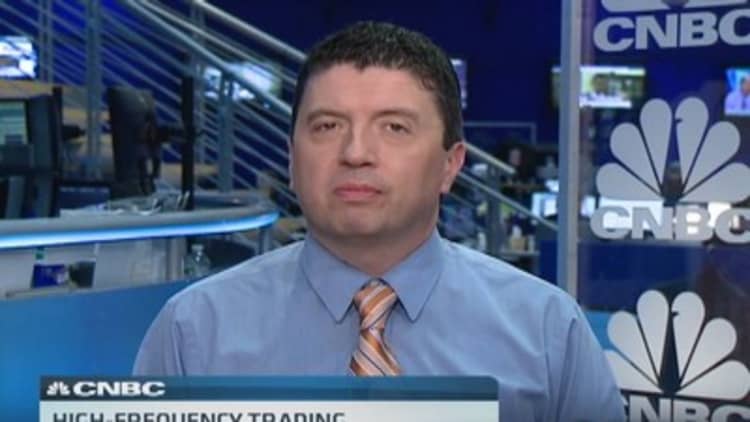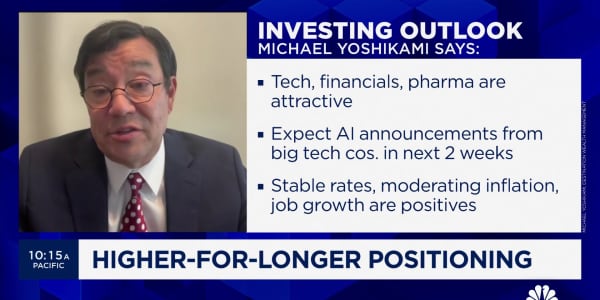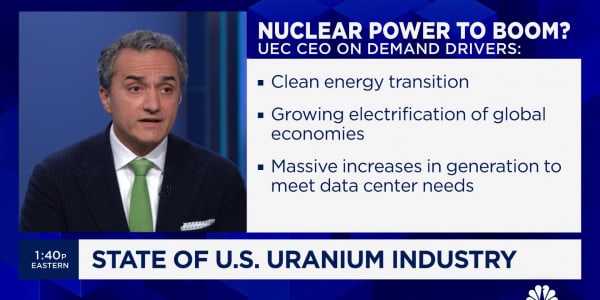
Even some ardent fans of high-speed stock trading admit it's not perfect and needs to be fixed.
No single issue has polarized Wall Street talk in 2014 like high-frequency trading, or HFT, in which firms use blindingly fast computer programs to try to step in front of each others' trades.
The use of speed is as old as the financial market itself. The way that speed is deployed, however, is new and garnering much attention, particularly since the publication of Michael Lewis' book "Flash Boys," the portrait of one firm's efforts to make high-frequency trading a more equitable endeavor by having trades routed to multiple exchanges simultaneously.
HFT lobbyist Peter Nabicht, policy adviser for the Modern Markets Initiative, spoke earlier this week at a forum sponsored by the Tabb Group and outlined a few of the things he'd like to see changed.
Read MoreSEC smacks NYSE for violating trading rules
Paramount on that list is the practice of "spoofing," or submitting anonymous bids then withdrawing them in a matter of seconds. The idea is to push a price up briefly, get others to buy, then selling shares at a higher profit. The entire process can be accomplished in a second or two and is one of the main faults detractors find with HFT.
Regulators should take quick action to penalize those involved with the practice, Nabicht said in an interview with ValueWalk:
Manipulation or spoofing hurts all legitimate market participants and those doing it should be removed from the markets. If you do many of the firms using HFT will be the first to stand up and cheer. But don't throw out what is working with what needs to be addressed.
Rather than lay waste to the entire industry, Nabicht said, regulators should seek to root out those breaking the rules:
The bad actors engaged in manipulation should be expelled from the industry
Two facts about HFT get considerably less discussion than the furor surrounding it are that trading volumes actually have turned flat and prices are lower.
Read MoreThink the 'FlashBoys' are taking over? Think again
Indeed, making the kind of investment Lewis describes in his book of a firm laying thousands of miles of transmission cables to get a speed advantage is costly and sometimes not terribly efficient.
Playing the speed game between Chicago and New York is expensive. And trading a speed game in the equity markets with dark pools is expensive, but if it is required by your strategy then the investment is available to you.
However, some observers believe the point is coming when the race to shave microseconds off trading time becomes prohibitive.
Brian Mannix, an economics professor at George Washington University who merited a brief mention in "Flash Boys" for his proposal to use brief, random delays in trading to disrupt high-speed machines, compared the situation to the race for speed at commercial fisheries.
Read MoreFidelity, Scottrade deny clients anti-HFT choice
In that case, the race for bigger, faster boats and larger nets ultimately become too expensive and no longer cost-efficient.
In an essay for Tabb Forum (a subscription service), he believes HFT firms are nearing a similar point.
The overcapitalization of a fishery—excess investment in fast boats and other capital that may be used only a few weeks out of the year—is so obviously wasteful that fishery managers may impose "gear restrictions" and other regulatory impediments in an attempt to reduce the waste. But when one factor of production is constrained, extra effort is channeled into another factor; the race continues on whatever margin is available until it is no longer worth it, the rents are exhausted and the market clears. Note that competition in the race to fish will drive profits to zero, but that emphatically does not mean that it will drive costs to zero. The deadweight loss is real: The waste is not that someone is making a profit, but that no one is.
... Racing in financial markets bears a superficial resemblance to racing in fisheries. Indeed, the reported investments in high-speed data centers, fiber-optic linkages, and other accoutrements of high-frequency trading bear an uncanny resemblance to the overcapitalization that one sees in poorly regulated fisheries. Here the remedy must be different, however, because the underlying market failure is different.
While Lewis has been calling the markets "rigged," investment pros have been scrambling to try to convince their clients that despite the inefficiencies, stocks are still the best place for money to go.
As Larry Zimpleman, head of Principal Financial Group, said this week in a post forThe Wall Street Journal's The Experts section:
Let's be sure that the regulators take a good look at all these practices to adopt rules more reflective of the electronic world we all live in. But let's not let a concern about HFT cause us to make the worst investment decision—to not invest in equities or even worse, not to invest at all.






